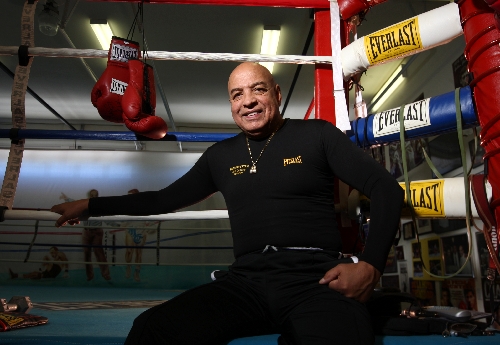Longtime boxing referee Cortez retiring, but not throwing in the towel
Boxing isn't exactly known for its insightful thinkers, but that's part of what has made referee Joe Cortez so special.
He has spent decades tuning his ring mechanics and schooling a generation of referees in the underrated art of being a boxing match's third man. With approximately 200 world championship title fights to his credit and a 2011 induction into the International Boxing Hall of Fame, his rank among the fight game's top referees is undisputed.
Now 68, Cortez has long been known for taking his work home with him. For years he has kept a ring at his house on the northwest end of the valley to use for training and for refereeing seminars. Although his career hasn't been free of controversy - he was criticized for stepping in to stop the Floyd Mayweather Jr.-Victor Ortiz fight in September 2011 - Cortez has managed to remain above the fray.
He retired quietly Saturday night after working the WBC light-middleweight title fight that saw Saul "Canelo" Alvarez stop Josesito Lopez in the fifth round at the MGM Grand Garden arena. Cortez was in the middle of the action until the end.
I thought his departure might be heralded as the end of an era, but perhaps the sporting crowd realizes Cortez really isn't going anywhere. And that's a good thing for the battered sport.
Like others who have donated blood and sweat to the Sweet Science, Cortez worries about boxing's growing reputation as a punch-drunk profession. With the rising popularity of mixed martial arts fighting, Team USA's awful performance in the Summer Olympics, and some suspect decisions in high-profile title bouts, critics say boxing's best days are part of a highlight reel narrated by Howard Cosell.
Cortez believes he can do something about that.
Not only is he busy working to raise the collective education of referees, judges and even timekeepers by conducting seminars from here to Aruba, but he also has a plan to increase the precision of fight judging by improving their line of sight.
He calls the idea "Cortez 2020."
"Don't blame the poor judges," Cortez says. "They call them corrupt. They call them blind. They call them too old. The fact is, being on the apron they often have the worst seats in the house."
At ringside, a judge's view is commonly blocked by ring ropes, the referee and the fighters themselves. Cortez has extensively tested his theory that a judge's ability to see punches is greatly improved by raising his line of sight about 8 feet above the canvas. In tests with veteran judges, those positioned above the ring saw nearly every punch. Their counterparts on the apron commonly missed more than a dozen punches per round.
It's a simple but ingenious idea, one that could improve the reputation of a sport whose scoring has at times had all the credibility of a Mafia raffle.
He believes his Cortez 2020 design can have an immediate impact. Other sports have grown and changed, he asks, why can't boxing?
Popcorn-crunching criticism aside, referees and judges are better trained today than at any time in boxing's history, Cortez says, but "if you're out of position, you can miss a punch."
While other sports have increasingly taken advantage of instant replay, boxing hasn't changed so much as its socks. Cortez believes adjusting the line of sight of judges will improve the quality without losing the human element.
That project ought to keep his hands full in retirement.
"I don't want the sport dying," he says. "I want to help give it a shot in the arm, revive it, and get it back where it belongs."
Will boxing's promotional bosses, sanctioning bodies and regulatory commissions embrace his idea?
They should. Cortez not only has a rare insight into the sport he loves, but he possesses a quality that's always been in short supply in the fight game.
Credibility.
John L. Smith's column appears Sunday, Tuesday, Wednesday and Friday. E-mail him at Smith@reviewjournal.com or call (702) 383-0295. He also blogs at lvrj.com/blogs/Smith






















